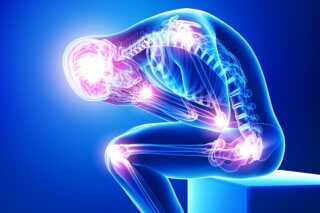Pain and Resilience

Most of us know someone who lives with chronic pain. Maybe it's a friend, a family member, or maybe even you. Two people may have the same condition, and react to it in entirely different ways. One may give up, while another refuses to give up. It's apparent that attitude has a lot to do with it.
The Pain Resilience Scale?¹ is composed of 14 statements that determine how one responds when it comes to managing intense or prolonged pain.
The statements on the scale are:
When faced with intense or prolonged pain....
1. I will get back out there.
2. I push through it.
3. I will still accomplish my goals.
4. I try to continue working.
5. I like to stay active.
6. I focus on positive attitude.
7. I keep a positive attitude.
8. It doesn't affect my happiness.
9. I still find joy in my life.
10. I keep a hopeful attitude.
11. I don't let it get me down.
12. I don't let it upset me.
13. I avoid negative thoughts.
14. I try to stay relaxed.
For each statement, the answer choices are:
0. Not at all
1. To a slight degree
2. To a moderate degree
3. To a great degree
4. All the time
The complete Pain Resilience Scale can be downloaded here.
The crux of the Pain Resilience Scale is that outlook, attitude, and behavior have a lot to do with living with, and coping with, chronic pain. Chronic pain may have a profound effect on mental health, resulting in stress, anxiety and depression.²
The question may be, "How can I pretend to feel good when I live with chronic pain?" This is not meant to make light of anyone's situation, but there's an old saying, "Fake it 'til you make it." Making your mental health, your attitude, and your emotional state a priority can lead to positive outcomes in dealing with chronic pain. This may mean seeing a mental health professional. Cognitive Behavioral Therapy can help change negative thought patterns that contribute to pain, reduce the impact on your mental health, and help with coping skills for dealing with it in a more postive way. It can help break the cycle of pain/mental distress/pain/mental distress.
CryoDerm was founded on the principle of helping people lead people who suffer from pain--whether that's short-term pain from an injury, or chronic pain, with plant-based topical pain relief products and our plant-based supplement, REZUME®. REZUME®.works on a cellular, systemic level, delivering and reinforcing some of the same great Natural Ingredients found in CRYODERM®. Synergistic herbal extracts that have been used in traditional medicine for centuries are utilized to create a maximizing effect of each individual ingredient. We don't make any products that contain parabens, dyes, gluten, aspirin, or NSAIDs.
We don't suggest that our products are a cure for a medical condition. But we do suggest that's they're an effective, non-narcotic way of helping people cope with chronic pain, and be able to live their best life. When you feel better, you're less likely to give in to stress, depression, anxiety, and negativity.
We hope you feel better, and we're honored when you allow us to help.
1. Slepian, P.M., Ankawi, B., Himawan, L.K., & France, C.R. (2016). Development and initial validation of the Pain Resilience Scale. Journal of Pain, 17, 462-472 DOI: https://doi.org/10.1016/j.jpain.2015.12.010
2. Flynn DM. Chronic Musculoskeletal Pain: Nonpharmacologic, Noninvasive Treatments. Am Fam Physician. 2020 Oct 15;102(8):465-477. PMID: 33064421.
Posted In:
Stress Management
Pain Management
Ingredients